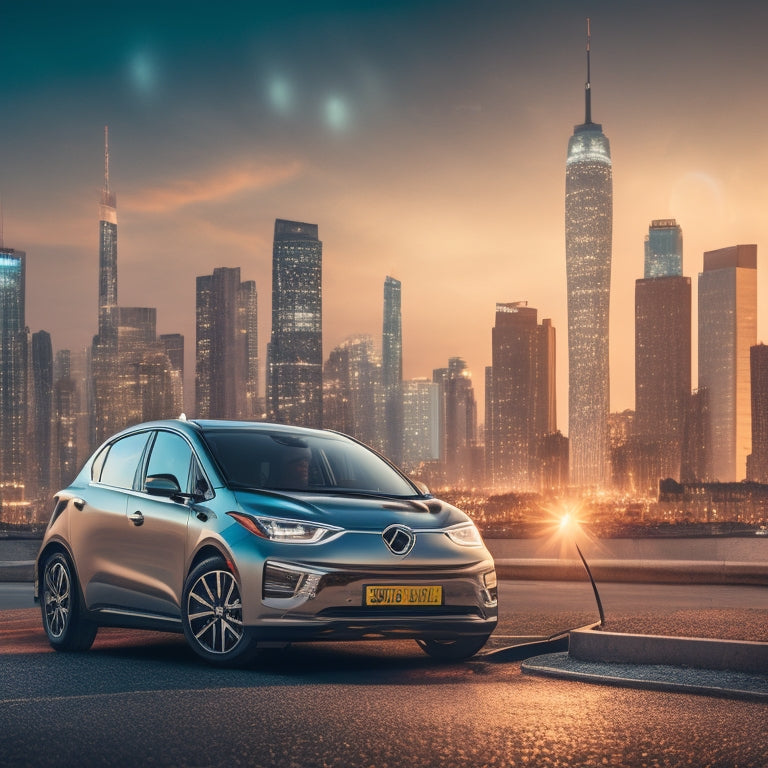
Unlocking Savings: Electric Vehicle Incentives Revealed
Share
Electric vehicle (EV) ownership can be made more affordable through a combination of smart charging strategies and government incentives, greatly reducing the overall cost of EV ownership. Smart charging during off-peak hours can lower electricity rates, while government incentives, such as the Federal Plug-in Electric Vehicle Credit and state programs like Charge NY, offer rebates and tax credits. Understanding these incentives and optimizing charging strategies is essential to maximize savings. By leveraging these opportunities, EV owners can access substantial financial benefits, and exploring the details of these incentives can reveal even more ways to reduce the cost of EV ownership.
Key Takeaways
• Off-peak charging strategies can significantly reduce electricity costs by taking advantage of lower rates during non-peak hours.
• Federal and state governments offer incentives like tax credits and rebates, such as the Plug-in Electric Vehicle Credit, to encourage electric vehicle adoption.
• Understanding eligibility for these incentives is crucial to maximize financial benefits, with programs like Charge NY providing rebates and discounts.
• Charging during off-peak hours not only saves customers money but also alleviates strain on the grid during peak hours.
• Combining cost-effective charging strategies with government incentives can make electric vehicle ownership more affordable and environmentally friendly.
Savings Through Smart Charging
Optimizing electric vehicle (EV) charging through voluntary time-of-use (VTOU) rates can yield significant financial benefits for customers, as off-peak hours typically offer lower electricity rates, reducing overall energy costs.
By adopting smart charging strategies, EV owners can take advantage of peak hour savings, reducing their energy expenditure. VTOU rates allow customers to shift their EV charging to off-peak periods, resulting in lower electricity bills.
This approach not only benefits customers financially but also helps alleviate strain on the grid during peak hours. By leveraging VTOU rates and smart charging strategies, EV owners can access significant savings, making electric vehicle ownership more economical and environmentally friendly.
Government Incentives Uncovered
Government incentives play an important role in promoting the adoption of electric vehicles. Various programs and initiatives offer significant financial benefits to encourage environmentally friendly transportation. Understanding these incentives is critical for maximizing benefits and optimizing savings.
To achieve this, it is necessary to determine incentive eligibility, which varies depending on the program or initiative.
-
Federal Plug-in Electric Vehicle Credit offers up to $7,500 tax credit
-
State incentives, such as Charge NY, provide rebates and discounts on tolls and HOV lane access
-
Alternative Fuel Infrastructure Tax Credit supports residential customers with tax credits for home charging stations
Charging Forward With Incentives
Electric vehicle incentives have evolved substantially, offering a wide range of benefits that cater to diverse customer needs, from reducing costs to promoting environmentally friendly transportation. To maximize savings, it's crucial to understand incentive eligibility and cost-effective charging strategies.
By charging during off-peak hours, customers can take advantage of lower electricity rates, reducing their overall energy costs. In addition, state and federal incentives provide additional financial benefits, such as rebates and tax credits, making electric vehicle ownership more affordable.
Frequently Asked Questions
Can I Use the Voluntary Time-Of-Use Rate for My Business?
Businesses can leverage the Voluntary Time-of-Use (VTOU) Rate to optimize energy efficiency, reducing commercial energy costs by charging electric vehicles during off-peak hours, thereby realizing significant commercial benefits through energy-efficient practices.
Are There Incentives for Installing EV Charging Stations at Home?
As the electric vehicle landscape continues to evolve, homeowners can capitalize on enticing incentives, such as the Alternative Fuel Infrastructure Tax Credit, to offset home charging station costs, making sustainable living more accessible and affordable.
Do State Incentives Vary Depending on the Type of Electric Vehicle?
State incentives for electric vehicles often vary based on vehicle classification, with tiered incentives offering more substantial benefits for zero-emission vehicles, plug-in hybrids, and battery electric vehicles, with distinct incentive tiers for each classification.
Can I Claim Federal Incentives if I Buy a Used Electric Vehicle?
"Break a leg" with used EV purchases! Federal incentives are available, but with caveats. Used EV benefits are limited; only the original buyer can claim the Federal Plug-in Electric Vehicle Credit, leaving subsequent owners ineligible for this perk.
Are There Any Local Incentives for Electric Vehicle Owners in My Area?
Local electric vehicle owners can explore municipal discounts, regional rewards, and city perks, such as preferential parking, waived fees, and exclusive charging rates, by researching local government websites and contacting municipal authorities for information on available local benefits.
Related Posts
-

3 Sun-Powered Automated Shades for Energy-Savvy Homes
You're looking to change your home into an energy-savvy haven, and sun-powered automated shades are an essential step...
-

5 Ways Geothermal Power Boosts Electric Vehicle Efficiency
You're likely unaware that geothermal power can greatly enhance your electric vehicle's (EV's) performance, range, an...
-

10 Best Energy-Efficient External Hard Drives for Sustainable Offices
When it comes to sustainable offices, you need external hard drives that balance data storage needs with energy effic...


